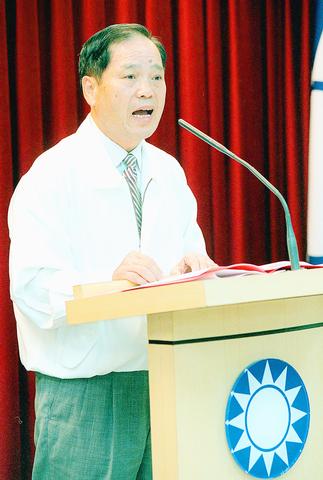After months of hemming and hawing, the KMT yesterday officially called it quits with its estranged former chairman, Lee Teng-hui (
The party yesterday revoked Lee's membership, saying he violated party rules.

PHOTO: AFP
KMT members have been upset with Lee's carousing with the Taiwan Solidarity Union, a rival political group. They're also infuriated with his criticism of the party.
Lee himself is angry with the KMT's infidelity to the pro-Taiwan and localization policies that he worked to implement during his 12 years in power.
Chen Kang-chin (
But the KMT had to go forward with its long-contemplated move, saying "the situation has proven to be irreversible despite all the efforts that have been made."
Chen also said that the KMT had to break off its relationship with Lee for the good of the party. "Any party with organization and discipline can never tolerate malicious defamation made against it by its members," he said.
Chen said committee members attending yesterday's meeting agreed that Lee had committed "severe violations" of the party's charter. Lee has betrayed the party's resolutions, blemished its reputation and harmed the party's interests, Chen said.
Huang Ta-chou (黃大洲), Lee's former student and a committee member, stayed clear of yesterday's meeting.
Huang said he didn't agree with Lee's recent conduct, but added that it was inconvenient for him to express any opinion on the matter in light of his relationship with Lee.
Lee's support of the TSU has been seen by the KMT as an open challenge to the party. The former president has said the TSU's ideals are consistent with his own, and that he'll do everything possible to help the new political party achieve victory in the year-end legislative elections.
During a Taichung rally on Sunday, Lee even challenged the KMT to kick him out of the party, but he denied he was the one that needed discipline.
Instead, Lee said KMT members who have strayed from the anti-communist path and pandered to leaders in Beijing should be punished first.
Lee's Sunday remarks were made in response to a letter the KMT sent to him two days earlier, in which the party urged him to quit on his own accord if he "doesn't identify with the party's ideals."
The letter was written after attempts to meet with Lee in person failed.
According to the KMT's definition, a "revocation of membership" is a lighter punishment than "expulsion."
Those who have their membership revoked can have their membership restored one year later. Members who are expelled are not allowed to rejoin until two years after their ouster.
Lifetime membership in the party runs NT$10,000.
KMT Chairman Lien Chan (
"The party has its rules, and we have to act according to the system," Lien said.
Lee is the first former KMT chairman to be ousted from the party in its 107-year history, though he's not the first party leader to get the boot.
In 1995 -- under Lee's leadership -- the KMT revoked the membership of two vice chairmen, Lin Yang-kang (
Former Taiwan Provincial Governor James Soong (

DAREDEVIL: Honnold said it had always been a dream of his to climb Taipei 101, while a Netflix producer said the skyscraper was ‘a real icon of this country’ US climber Alex Honnold yesterday took on Taiwan’s tallest building, becoming the first person to scale Taipei 101 without a rope, harness or safety net. Hundreds of spectators gathered at the base of the 101-story skyscraper to watch Honnold, 40, embark on his daredevil feat, which was also broadcast live on Netflix. Dressed in a red T-shirt and yellow custom-made climbing shoes, Honnold swiftly moved up the southeast face of the glass and steel building. At one point, he stepped onto a platform midway up to wave down at fans and onlookers who were taking photos. People watching from inside

A Vietnamese migrant worker yesterday won NT$12 million (US$379,627) on a Lunar New Year scratch card in Kaohsiung as part of Taiwan Lottery Co’s (台灣彩券) “NT$12 Million Grand Fortune” (1200萬大吉利) game. The man was the first top-prize winner of the new game launched on Jan. 6 to mark the Lunar New Year. Three Vietnamese migrant workers visited a Taiwan Lottery shop on Xinyue Street in Kaohsiung’s Gangshan District (崗山), a store representative said. The player bought multiple tickets and, after winning nothing, held the final lottery ticket in one hand and rubbed the store’s statue of the Maitreya Buddha’s belly with the other,

‘NATO-PLUS’: ‘Our strategic partners in the Indo-Pacific are facing increasing aggression by the Chinese Communist Party,’ US Representative Rob Wittman said The US House of Representatives on Monday released its version of the Consolidated Appropriations Act, which includes US$1.15 billion to support security cooperation with Taiwan. The omnibus act, covering US$1.2 trillion of spending, allocates US$1 billion for the Taiwan Security Cooperation Initiative, as well as US$150 million for the replacement of defense articles and reimbursement of defense services provided to Taiwan. The fund allocations were based on the US National Defense Authorization Act for fiscal 2026 that was passed by the US Congress last month and authorized up to US$1 billion to the US Defense Security Cooperation Agency in support of the

‘COMMITTED TO DETERRENCE’: Washington would stand by its allies, but it can only help as much as countries help themselves, Raymond Greene said The US is committed to deterrence in the first island chain, but it should not bear the burden alone, as “freedom is not free,” American Institute in Taiwan Director Raymond Greene said in a speech at the Institute for National Defense and Security Research’s “Strengthening Resilience: Defense as the Engine of Development” seminar in Taipei yesterday. In the speech, titled “Investing Together and a Secure and Prosperous Future,” Greene highlighted the contributions of US President Donald Trump’s administration to Taiwan’s defense efforts, including the establishment of supply chains for drones and autonomous systems, offers of security assistance and the expansion of